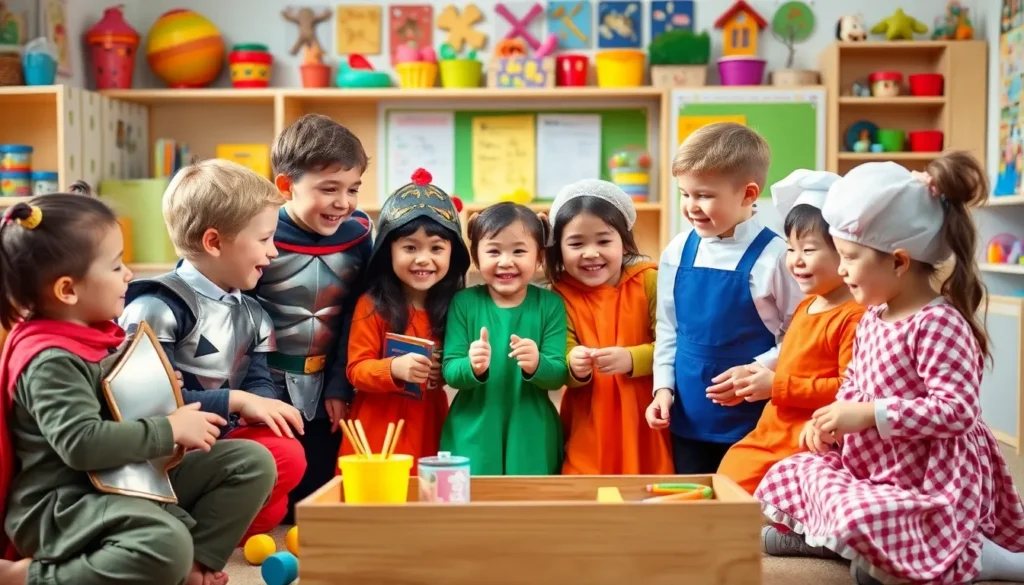In a world where imagination reigns supreme, Montessori fantasy play offers children a magical escape into realms where anything is possible. This unique approach encourages kids to unleash their creativity while developing essential skills. Picture this: a child transformed into a fearless knight, battling dragons made of couch cushions, or a budding chef whipping up imaginary feasts in a make-believe kitchen.
Montessori fantasy play isn’t just fun and games; it’s a vital part of a child’s development. It fosters problem-solving, social skills, and emotional intelligence, all while ensuring they have a blast. So, why not dive into the enchanting world of Montessori fantasy play? It’s where learning meets laughter, and every day is an adventure waiting to unfold.
Table of Contents
ToggleOverview of Montessori Fantasy Play
Montessori fantasy play serves as a vital tool in child development. This play method encourages children to engage in imaginative scenarios, greatly fostering creativity. Through role-playing as knights, chefs, or other characters, children explore various narratives and themes. Skills such as problem-solving and social interaction emerge naturally during these activities.
Social skills enhance as children collaborate with peers. Communication becomes clearer, as they negotiate roles and share ideas. Emotional intelligence develops through role reversals and empathy exercises, enabling children to understand others’ feelings and perspectives.
Furthermore, Montessori fantasy play creates a safe space for risk-taking. Children can experiment with new ideas without the fear of failure. This environment nurtures independence and self-confidence, allowing them to express thoughts freely.
Enhancing learning experiences, fantasy play integrates essential life lessons into enjoyable activities. Children develop critical thinking by navigating challenges in their imaginative worlds. They often solve problems by figuring out how to overcome obstacles they encounter in their scenarios.
Research supports the notion that imaginative play is crucial for cognitive development. Engaging in fantasy play leads to improved language skills and greater vocabulary. Skills developed through this process set a solid foundation for future learning.
In essence, Montessori fantasy play is more than just fun. It unites creativity with critical developmental milestones, proving essential for a child’s growth. Embracing this form of play fosters holistic learning experiences that yield lasting benefits.
Benefits of Montessori Fantasy Play

Montessori fantasy play offers numerous advantages for children’s development. Through imaginative scenarios, children cultivate essential skills that contribute to their growth.
Enhancing Creativity and Imagination
Imaginative play sparks children’s creativity and imagination, allowing them to explore diverse roles and scenarios. Engaging in activities like pretending to be pirates or scientists, children express their unique ideas and perspectives. Creativity flourishes as they invent stories, create characters, and solve challenges within their play. Supporting this, research shows that imaginative play leads to better problem-solving skills. Enhanced creativity in early childhood often translates to improved innovation and adaptability in later life.
Developing Social Skills
Social skills significantly benefit from Montessori fantasy play. Collaborating with peers during role-play nurtures communication and negotiation abilities. Children learn to take turns, share ideas, and resolve conflicts through interactive play. This interaction fosters empathy and strengthens relationships among peers. Moreover, researchers emphasize the connection between play and social competence. As children engage in various roles, they develop a deeper understanding of social dynamics, enhancing their ability to navigate real-world situations.
Key Components of Montessori Fantasy Play
Montessori fantasy play involves several key components that enhance children’s learning experiences. Each component plays a significant role in supporting growth and development.
Child-Centered Environment
A child-centered environment encourages autonomy and creativity. Materials for fantasy play are intentionally chosen to foster imaginative scenarios. Spaces are designed to be inviting and accessible, allowing children to explore without constraints. Children freely select props and materials, which enrich their storytelling and role-playing. This flexibility promotes ownership of their play experiences while developing decision-making skills.
Role of Educators and Guides
Educators and guides facilitate Montessori fantasy play through observation and support. They recognize children’s interests, stepping back to allow exploration. When needed, they provide gentle guidance to enhance learning opportunities. Role-playing scenarios are enriched by educators asking open-ended questions, prompting deeper thinking. Their involvement ensures a balance between independence and support, helping children navigate social interactions and problem-solving effectively. This approach nurtures a sense of community, reinforcing essential social skills in group settings.
Implementation of Montessori Fantasy Play in Classrooms
Montessori classrooms thrive when fantasy play is present. Educators create a rich environment filled with tools and materials that inspire imaginative scenarios. Children use props like dress-up costumes, kitchen sets, and building blocks to transform into various characters, from chefs to astronauts. These resources encourage exploration and role-playing among peers.
Facilitators observe play and step in to support without dominating the experience. They’ll ask open-ended questions, prompting children to think critically about their scenarios. Effective guidance enriches the play, enhancing problem-solving capabilities and encouraging creativity.
Engaging in collaborative projects boosts communication skills, as children negotiate roles and share their ideas with one another. This interaction cultivates emotional intelligence, allowing them to experience empathy and understand diverse perspectives during their imaginative journeys.
A well-organized space plays a crucial role in encouraging independence. Children can freely choose their activities, fostering decision-making skills while exploring creative outlets. Structured areas dedicated to different themes, like a grocery store or a construction site, invite endless possibilities for play and collaboration.
Integrating fantasy play into daily routines also reinforces learning objectives. Children gain confidence as they navigate challenges and experiment with new ideas within their imaginative worlds. Role-playing enables them to practice social dynamics in a safe environment, preparing them to handle real-life situations with ease.
Montessori fantasy play incorporates essential developmental milestones, ensuring children develop holistically. Schools prioritizing imaginative play within the curriculum foster creativity, social skills, and emotional growth, ultimately laying a strong foundation for future learning.
Montessori fantasy play stands as a powerful tool in children’s development. It nurtures creativity and critical thinking while enhancing social skills through collaboration. By providing a safe environment for exploration and risk-taking, it fosters independence and self-confidence.
This imaginative play not only entertains but also embeds essential life lessons into enjoyable activities. As children engage in role-playing scenarios, they learn to navigate social dynamics and develop emotional intelligence. The benefits extend beyond the classroom, laying a strong foundation for future learning and interpersonal relationships.
Embracing Montessori fantasy play enriches the developmental journey, ensuring children grow into well-rounded individuals equipped for the challenges of the real world.




